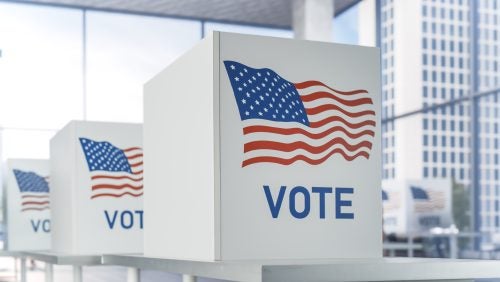Georgetown Law’s Institute for Constitutional Advocacy and Protection Announces Historic Settlement in 2020 Fraudulent Electors Case
March 28, 2024

On March 4, Georgetown Law's Institute for Constitutional Advocacy and Protection (ICAP), Law Forward and Stafford Rosenbaum LLP announced a historic settlement in first-of-its-kind litigation against participants in a fraudulent electors scheme intended to overturn the results of the 2020 presidential election.
The March agreement marks ICAP’s second milestone settlement in the case of Penebaker et al v. Hitt et al, the first suit in the country filed against fraudulent electors. Following last year’s agreement with 10 fraudulent electors in Wisconsin, the latest settlement resolves the case against the remaining defendants, former President Donald Trump’s Wisconsin campaign attorney, James Troupis, and legal adviser, Kenneth Chesebro.
“[This case] was about accountability for what was a significant part of a multipronged effort to overturn the vote in 2020,” said ICAP Executive Director and Visiting Professor Mary McCord, L’90. McCord emphasized that the settlement not only sheds light on the creation and execution of the fraudulent electors scheme, but also reveals how Troupis and Chesebro served as its architects in Wisconsin and other swing states.
Transparency and accountability are central to ICAP’s use of strategic, non-partisan legal advocacy. The institute works at the state and federal levels to defend constitutional rights and restore confidence in governmental institutions across five key issue areas, including safeguarding First Amendment rights and reforming policing and criminal justice.
Accountability amid chaos
As part of the latest settlement, the defendants agreed not to participate in a similar scheme in any future presidential election. They also provided access to what McCord called a “significant trove” of previously undisclosed emails, text messages and other documents that demonstrate their scheme was implemented with the aim of creating chaos during the January 6 attack on the Capitol.

ICAP Executive Director Mary McCord
“This new settlement has shown through emails and text messages that it was the goal very early on, just days after the election, to do whatever needed to be done — through this fraudulent electors scheme, through pressure on state legislatures, through pressure on the vice president and through chaos on January 6 — to overturn the [election] results and have Trump be declared the winner,” McCord said.
In addition to the Penebaker settlement, ICAP has successfully advocated this year on a range of issues including student school-board participation in Maryland and a housing advocate program offered by the South Carolina State Conference of the NAACP.
ICAP is also involved in two U.S. Supreme Court cases this spring: On March 18, ICAP Faculty Chair Professor Neal Katyal argued National Rifle Association v. Vullo on behalf of Maria Vullo, former Superintendent of the New York City Department of Financial Services. ICAP attorneys co-counseled with Katyal on the Vullo brief. In April, ICAP Supreme Court Director Kelsi Corkran will argue on behalf of the homeless residents of Grants Pass, Ore., who are challenging ordinances that make it unlawful to sleep or rest on public property in Grants Pass v. Johnson.
McCord also pointed to the success of a series of regional political convenings that ICAP has held over the past two years to advise public officials about threats to elections, election officials and participation in democratic processes. “That’s the kind of work we’ll be continuing to do as we go forward,” she said.
A ‘monumental win’
In reflecting on the Penebaker case, McCord acknowledged the contributions of Georgetown Law students enrolled in the institute’s Constitutional Impact Litigation Practicum. The practicum is held each semester and offers students the opportunity to work directly with ICAP attorneys and contribute to strategic litigation and policy development.
Dustin Vesey, M.S.F.S.’24, L’24, took the practicum last fall as a way to gain experience in constitutional litigation. “I was given real responsibility right from the jump,” he said of his work on cases including Penebaker, for which he combed through thousands of pages of depositions from the U.S. House of Representatives January 6th Committee to compile information supporting ICAP’s legal strategy.
For Medha Raman, L’24, a current practicum student pursuing civil rights law after graduation, the course not only offers firsthand impact litigation experience, but also the chance to hear from experienced constitutional litigators as part of the practicum’s weekly seminar.
“I feel grateful that I had the opportunity to play a small part in this monumental win, both for ICAP and for transparency, accountability and justice more broadly,” she said of the fraudulent electors case.
Vesey agrees. “As I leave Georgetown after four years of graduate and professional studies, I can confidently say ICAP was one of the best experiences I had,” he said.